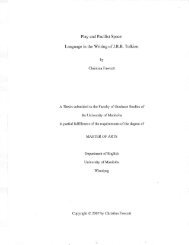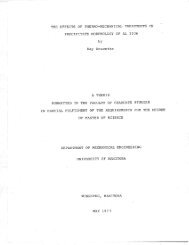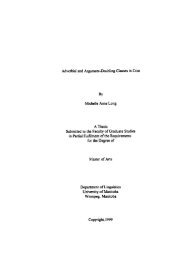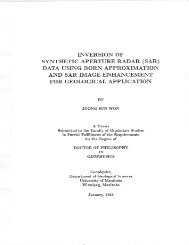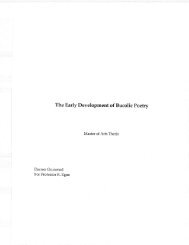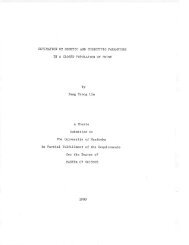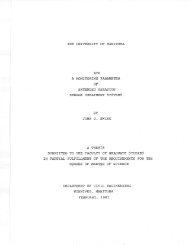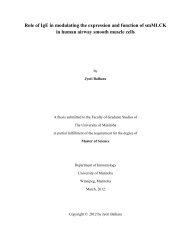- Page 1 and 2: NUTRTTiON SURVEY METHODS: EXPERiENC
- Page 3 and 4: NUTRITION SURVEY I{ETHODS: EXPERIEN
- Page 5 and 6: standardize a 1O-Second Dark Àdapt
- Page 7 and 8: Finally, I wish to thank my wife, s
- Page 9 and 10: .Vítamin A deficiency, a prevalent
- Page 11 and 12: ¿. RESUTTS 30 Data Cleaning 30 Des
- Page 13 and 14: LIST OF TÀBIES Table paqe 1. ¿. 3
- Page 15 and 16: tIST OF FIGURES Fiqure '1. Relation
- Page 17 and 18: Chapter 1 INTRODUCTION Malnutrition
- Page 19 and 20: Chapter 2 REVIEI^¡ OF THE TITERÀT
- Page 21 and 22: growth. Measurable growth retardati
- Page 23 and 24: LAND\ \ ÀGRI CULTURÀL PRODUCTION
- Page 25 and 26: minimum salaries (indicator of low
- Page 27 and 28: Possession of livestock (mirk anirn
- Page 29: the 3rd percentile at about 7 to I
- Page 33 and 34: Chapter 3 MATERIÀtS ÀND METHODS 3
- Page 35 and 36: 20 3 " 1 ,3 Food Production The siz
- Page 37 and 38: 22 (a) egricultural Variables (rood
- Page 39 and 40: 24 (E) uealth Variables (HeaIth Sta
- Page 41 and 42: 26 3,2 METHODS 3.2.1 Data collecLio
- Page 43 and 44: dependent variables. À significanc
- Page 45 and 46: Chapter 4 RESULTS 4.1 DATÀ CTEANIN
- Page 47 and 48: 32 TÀBtE '1 Age and sex distributi
- Page 49 and 50: 34 TABLE 5 Size of land cultivated
- Page 51 and 52: 36 TÀBLE 9 Classification of child
- Page 53 and 54: 38 4.3 ÀSSOCIATTON OF SOCIO-ECONOM
- Page 55 and 56: 40 TABTE 1 2 Effect of socio-econom
- Page 57 and 58: 42 important (in the current survey
- Page 59 and 60: 44 TABLE 1 5 Effects of child-feedi
- Page 61 and 62: 46 TÀBIE 1 7 Age, health and socio
- Page 63 and 64: Chapter 5 ÐI SCUSSI ON More childr
- Page 65 and 66: Whether or not the child rvas recei
- Page 67 and 68: (r=-0.42; p
- Page 69 and 70: Chapter 6 CONCLUSION in this study,
- Page 71 and 72: crops had significant effects on an
- Page 73 and 74: Chapter 7 iNTRODUCTION Vitamin A de
- Page 75 and 76: Chapter I REVIEW OF LITERATURE 8.1
- Page 77 and 78: During dark adaptation, a large amo
- Page 79 and 80: Classical Dark Àdaptation Test has
- Page 81 and 82:
66 centrate on the test light as th
- Page 83 and 84:
test light. 68 The stimulus consist
- Page 85 and 86:
70 TÀBIE 1 9 Comparison of scores
- Page 87 and 88:
(1977 ). nner using poker chips, ex
- Page 89 and 90:
there vras a complaint related to n
- Page 91 and 92:
Chapter 9 MÀTERIAtS ÀND METHODS 9
- Page 93 and 94:
10-Second Test were used. in experi
- Page 95 and 96:
were identified. Errors were reflec
- Page 97 and 98:
9.3.3 Experirnent iII 82 Five child
- Page 99 and 100:
Chapter '10 RESUTTS AND DISCUSSION
- Page 101 and 102:
86 Test times of adult subjects Tes
- Page 103 and 104:
88 Sources of variability in TÀBIE
- Page 105 and 106:
(p.0.0001 ), indicating that trial
- Page 107 and 108:
92 l1 t6 t5 ^lq v¡ êt3 o H¡Z vt
- Page 109 and 110:
Decision Procedure, indicating that
- Page 111 and 112:
96 10. 3 EXPERIMENT Iii : APPLICÀT
- Page 113 and 114:
98 Sources of variabiJ.ity in (1971
- Page 115 and 116:
For the 7-10 year old group, the me
- Page 117 and 118:
slight modification was made on the
- Page 119 and 120:
Chapter '11 CONCTUSiON This study s
- Page 121 and 122:
In conclusion, Thornton's (1977 ) n
- Page 123 and 124:
Hakim, P., and Solimano, G., 1978,
- Page 125 and 126:
Simko, M.0., Cowe11, C. and Gilbrid
- Page 127 and 128:
PART II - BIBTIOGRÀPHY Brown, G. C
- Page 129 and 130:
Sommer,4., Katz, J., and Tarwotjo,
- Page 131 and 132:
QUESTi ONNAI RE Appendix B REPRESEN
- Page 133 and 134:
118 ( ) 4. Divorced 18" Mother read
- Page 135 and 136:
120 ( ) 4. For poultry purposes ( )
- Page 137 and 138:
122 No. of all-owed repl i es : 1 .
- Page 139 and 140:
124 ( ) 2. No ( ) 3. Not applicable
- Page 141 and 142:
126 86. I^Ihy don't question ) you
- Page 143 and 144:
128 108. I,ihat are the foods that
- Page 145 and 146:
130 126 " Eco-zones No. of alLowed
- Page 147 and 148:
132 I " He i gtrt of chi Id Cen t i
- Page 149 and 150:
134 27. What are pregnant ? Months
- Page 151 and 152:
Appendix D LiST AND CODES OF STUDY
- Page 153 and 154:
Àppendix E LETTER OF PERMiSSION T0
- Page 155 and 156:
Appendix F LETTER OF REQUEST Univer
- Page 157 and 158:
My telephone number is: 142 Phone 4


![in partial fulfil]ment of the - MSpace - University of Manitoba](https://img.yumpu.com/21941988/31/500x640/in-partial-fulfilment-of-the-mspace-university-of-manitoba.jpg)
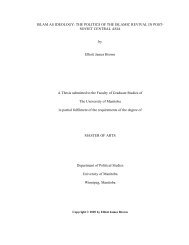
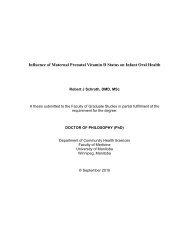
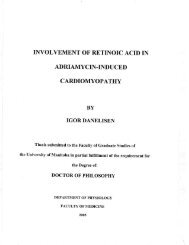
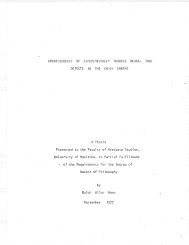
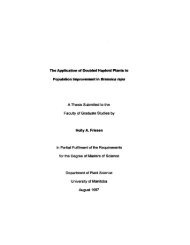
![an unusual bacterial isolate from in partial fulf]lment for the ... - MSpace](https://img.yumpu.com/21942008/1/190x245/an-unusual-bacterial-isolate-from-in-partial-fulflment-for-the-mspace.jpg?quality=85)
